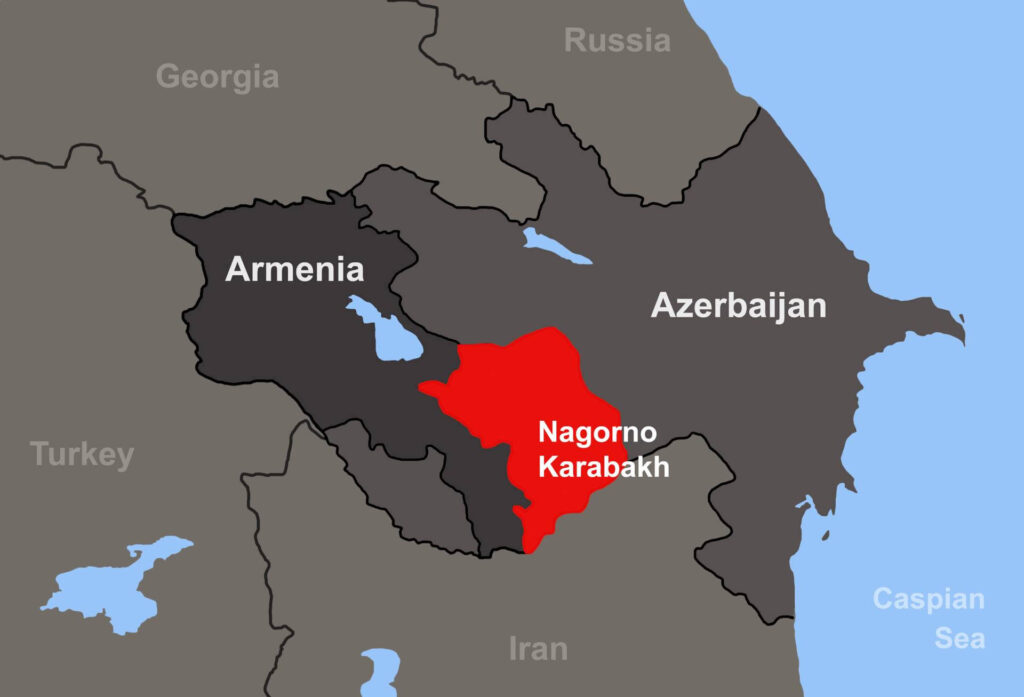In September 2023, Azerbaijan assumed full control of Karabakh, a region of the country that had previously been under the control of a breakaway entity, in a counter-terrorism measure.
On October 20, an author published a piece in Fair Observer accusing Azerbaijan of “ethnic cleansing” in Karabakh. He achieves this by lifting Azerbaijan’s measures out of all historical context.
The author misses the mark repeatedly referring to damage to the norms and principles of international law without explaining exactly what rights and principles have been violated, and his groundless arguments attempt to conceal Armenia’s well-known breaches of international law.
This piece attempts to contextualize the history behind the conflict. Claims that Azerbaijan is committed to “ethnic cleansing” are not supported by the decades of past conflict in the region.
Recognizing the history of Armenia’s illegal occupation of Azerbaijan
Between 1988 and 1994, during the first war, it was Armenia that illegally initiated the invasion of a significant portion of Azerbaijan’s internationally recognized sovereign territory.
This invasion forcibly displaced the better part of a million people in Azerbaijan, about a quarter of whom were Azeris who left Armenia for Azerbaijan as a result of the war. The Azeri population there had inhabited the region for centuries.
Armenian forces committed atrocities and numerous war crimes against Azerbaijanis. This has been confirmed by third-party international organizations. Among the massive killings of Azerbaijanis by Armenian armed forces, the Khojaly Genocide committed by Armenia stands as the largest single massacre throughout the entire conflict. On February 26, 1992, 613 Khojaly town residents, including 106 women, 63 children and 70 old men, were ambushed and brutally killed by Armenian forces.
In 1993, the UN Security Council unequivocally condemned Armenia’s illegal military occupation and ethnic cleansing in four resolutions (numbers 822, 853, 874 and 884). These resolutions expressed full support for Azerbaijan’s internationally recognized borders. They demanded the immediate, complete and unconditional withdrawal of all Armenian forces from the occupied territories.
Armenia undermines Azerbaijan’s peace efforts
Unfortunately, for three decades Armenia continually ignored the rules-based international order. Armenia participated in negotiations in bad faith, its aim being only to maintain the status quo. Armenia intensified its aggressive military-political provocations, and Armenians even began to speak of claiming more territories under the concept of “new wars for new territories.”
This ultimately jeopardized the peace process and led to a new war in 2020. This time, Azerbaijan was victorious. As a result of the war, known to Azerbaijanis as the Patriotic War, Azerbaijan liberated its occupied lands and ensured the norms and principles of international law.
Despite three decades of devastation experienced by the people of Azerbaijan, the country launched the peace initiative immediately after the trilateral statement of November 10, 2020. Azerbaijan actively promoted the idea of normalization of relations between the two countries and the peace process.
Azerbaijan has taken measures to carry out large-scale restoration and construction work in the liberated territories as well as facilitated the reintegration of Armenian residents living in the Karabakh region into our society.
Throughout the past three years, Armenia did not fulfill the obligation it took in the trilateral statement to remove more than 10,000 illegal armed forces. Azerbaijan also had reason to suspect Armenia of continuing to violate the agreement by providing funds and weapons to these armed forces. In one case, Azerbaijan’s Prosecutor General’s Office put several alleged criminals on a wanted list for smuggling firearms, ammunition, explosives and other military equipment from Armenia into Karabakh.
Ignoring the warnings of Azerbaijan at various levels and platforms, the illegal Armenian armed forces in the sovereign territories of Azerbaijan increased their provocations. This came to a head when a landmine explosion killed 4 police officers and two civilians in Azerbaijan.
Azerbaijan continues to urge stabilization in the Karabakh area
In response to military instigations and subversive acts by illegally present armed Armenian forces, the armed forces of Azerbaijan launched local counter-terror measures on September 19–20. These measures were aimed exclusively at neutralizing the imminent threat posed to the safety and security of Azerbaijani civilian and military personnel. This act fully aligned with Azerbaijan’s sovereign right to self-defense as enshrined in the UN Charter.
Despite the groundless “ethnic cleansing” and “mass displacement” narratives of the Armenian side, no facts have been revealed to prove the existence of losses among the civilian population. Reports of the UN mission that visited Karabakh noted “no damage to civilian public infrastructure, including hospitals, schools and housing, or to cultural and religious structures” in the areas it witnessed and “did not come across any reports – neither from the local population interviewed nor from the interlocutors – of incidences of violence against civilians following the latest local anti-terrorism measures.” So, the ethnic Armenians of Karabakh left on their own accord.
Unlike monoethnic Armenia, Azerbaijan is a multiethnic and multi-religious country. It ensures that all its citizens enjoy their rights as safeguarded by applicable international law. Azerbaijan has declared on multiple occasions that the ethnic Armenians residing in the Karabakh region are welcome to be part of this multicultural model. Therefore, the accusation that Azerbaijan had carried out “ethnic cleansing” is baseless.
Azerbaijan is committed to the normalization of relations between the two countries, as well as the reintegration of Armenian residents of the Karabakh region. Against the backdrop of these promising conditions, Azerbaijan calls upon Armenia to demonstrate a constructive position in the peace process, and to understand the realities in the region properly.
Armenia must finally recognize that there is no alternative to peace and cooperation in the region.
[Cheyenne Torres edited this piece.]
The views expressed in this article are the author’s own and do not necessarily reflect Fair Observer’s editorial policy.
The post Azerbaijan Fought for Security, not Ethnicity, in the Armenia-Azerbaijan Conflict appeared first on Fair Observer.
from World News - Independent, Nonprofit Media https://ift.tt/jvNPhae https://ift.tt/EGBm0LX






0 Comments
Online Latest Bangla News, Article - Sports, Crime, Entertainment, Business, Politics, Education, Opinion, Lifestyle, Photo, Video, Travel, National, World.
Emoji